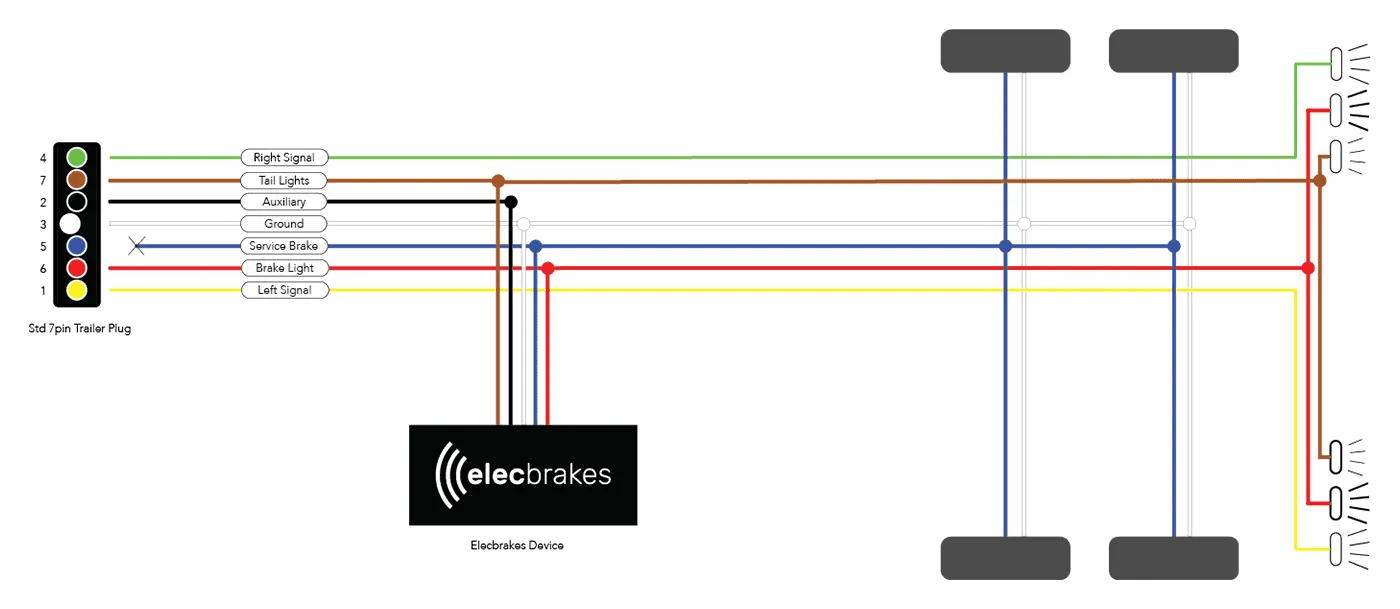Hauling a heavy trailer can be a nerve-wracking experience, especially when relying solely on your vehicle's brakes. Imagine descending a steep incline, your vehicle struggling to manage the combined weight. This is where electric trailer brakes become essential, providing an extra layer of stopping power and significantly enhancing control.
Electric trailer brakes offer a crucial safety advantage, allowing for smoother, more controlled stops, especially with heavier loads. They reduce the strain on your vehicle's braking system, extending its lifespan. But how do you equip your trailer with this essential safety feature? This comprehensive guide will delve into the intricacies of electric trailer brake installation, empowering you to take control of your towing experience.
Before diving into the installation process, let’s explore the evolution of trailer braking systems. Early trailers often relied solely on the towing vehicle's brakes, a system inadequate for heavier loads. The advent of electric brakes revolutionized trailer safety, providing independent braking power that significantly improved stopping distances and overall control. This shift towards enhanced safety has made electric brakes a standard feature on many modern trailers.
A key component in understanding electric brake installation is the brake controller. This device, installed in your towing vehicle, modulates the electrical signal sent to the trailer brakes, ensuring they engage proportionally to the vehicle's braking force. Choosing the correct brake controller and understanding its functionality is crucial for a successful installation.
Several factors can complicate the installation process. Wiring issues, incorrect brake controller settings, and compatibility problems between the trailer and the braking system are common challenges. This guide will address these potential pitfalls and offer practical solutions, ensuring a smooth and successful installation.
Electric brakes offer several advantages: improved safety, reduced wear and tear on the towing vehicle’s brakes, and better control, especially on downhill slopes. For example, imagine towing a boat down a steep ramp. Electric brakes provide the necessary stopping power, preventing the trailer from pushing the vehicle and ensuring a safe descent.
A successful electric brake installation requires careful planning and execution. Begin by gathering the necessary tools and components, including a brake controller, wiring harness, and mounting hardware. Consult your trailer and brake controller manuals for specific instructions and wiring diagrams.
Checklist:
Brake controller, Wiring harness, Mounting hardware, Connectors, Crimping tool, Wire strippers, Tester.
Step-by-Step Guide:
1. Mount the brake controller in your vehicle. 2. Connect the wiring harness to the brake controller and the trailer's wiring system. 3. Test the brake controller and adjust the settings according to the trailer's weight. 4. Verify all connections are secure and properly grounded.
Advantages and Disadvantages of DIY Installation
| Advantages | Disadvantages |
|---|---|
| Cost savings | Potential for errors |
| Sense of accomplishment | Time commitment |
Best Practices: 1. Use high-quality wiring and connectors. 2. Ensure proper grounding to prevent electrical issues. 3. Consult your vehicle and trailer manuals for specific instructions. 4. Test the system thoroughly after installation. 5. Consider seeking professional help if you encounter difficulties.
Challenges and Solutions: Wiring issues - consult a wiring diagram. Brake controller malfunction - check the manual or contact the manufacturer. Inconsistent braking - adjust the brake controller settings.
FAQ:
1. What type of brake controller do I need? 2. How do I wire the brakes? 3. How do I adjust the brake controller? 4. What are the common installation problems? 5. Where can I find installation instructions? 6. How do I test the brakes? 7. What safety precautions should I take? 8. When should I seek professional help?
Tips and Tricks: Use dielectric grease on all connections to prevent corrosion. Double-check all wiring before connecting the battery. Test the brakes in a controlled environment before hitting the road.
Installing electric brakes on your trailer is a crucial step in ensuring safe and controlled towing. By understanding the process, gathering the necessary tools, and following the steps outlined in this guide, you can significantly enhance your towing experience and protect yourself, your passengers, and other drivers on the road. Electric brakes provide a critical safety advantage, allowing for more controlled stops and reducing the strain on your vehicle’s braking system. While the installation process may seem daunting, the benefits far outweigh the challenges. Take the time to learn about the process, plan your installation carefully, and don’t hesitate to seek professional help if needed. Investing in this crucial safety upgrade will provide peace of mind and enhance your overall towing experience, ensuring safer travels for years to come.
Unlocking precision the thermocouple type s reference table
Rite aid allegheny ave
Beyond the fairway the enduring appeal of ladies of golf pictures
Wiring A Trailer With Electric Brakes - Khao Tick On
Brake Install Location at Brandon Holstein blog - Khao Tick On
Wiring Diagram For A Trailer With Electric Brakes - Khao Tick On
How To Rewire Trailer Lights - Khao Tick On
Trailer Wiring With Electric Brakes - Khao Tick On
Wiring Electric Trailer Brakes - Khao Tick On
how to install electric brakes on trailer - Khao Tick On
Check Trailer Brake Wiring Ram 2500 - Khao Tick On
how to install electric brakes on trailer - Khao Tick On
how to install electric brakes on trailer - Khao Tick On
Electric Brake Wiring Voltage - Khao Tick On
Trailer Wiring Australian Standard - Khao Tick On
Trailer Wiring Schematic With Electric Brakes - Khao Tick On
wiring diagram for tandem axle trailer Trailer wiring diagram axle - Khao Tick On
Wiring For Trailer Brakes - Khao Tick On














